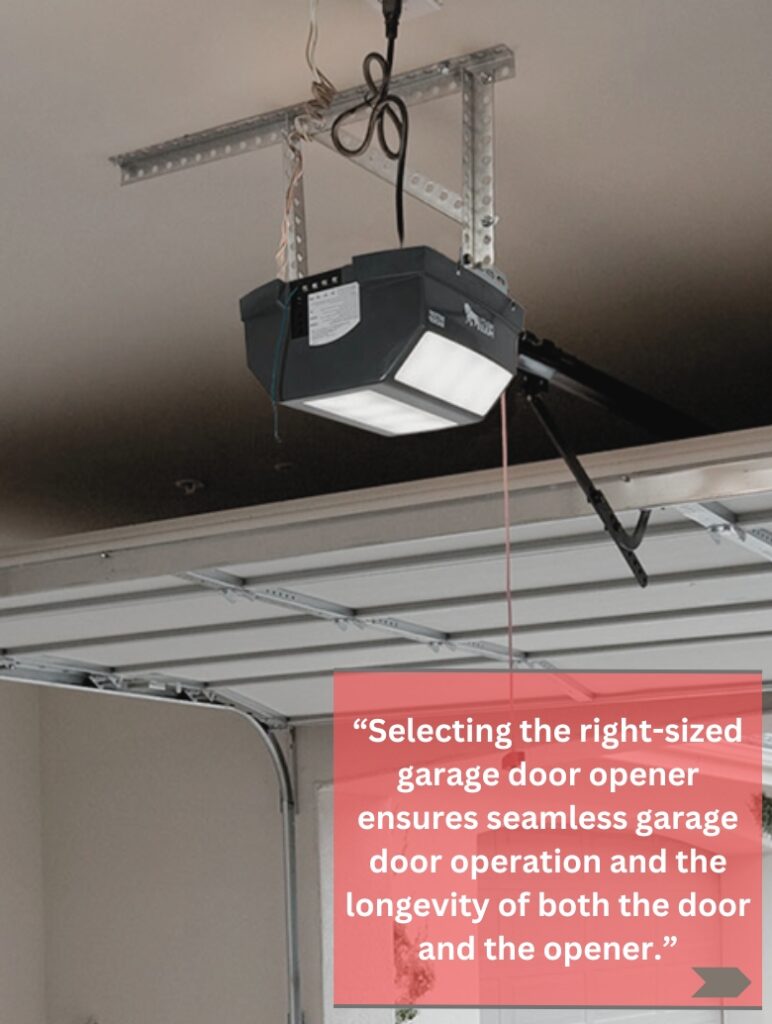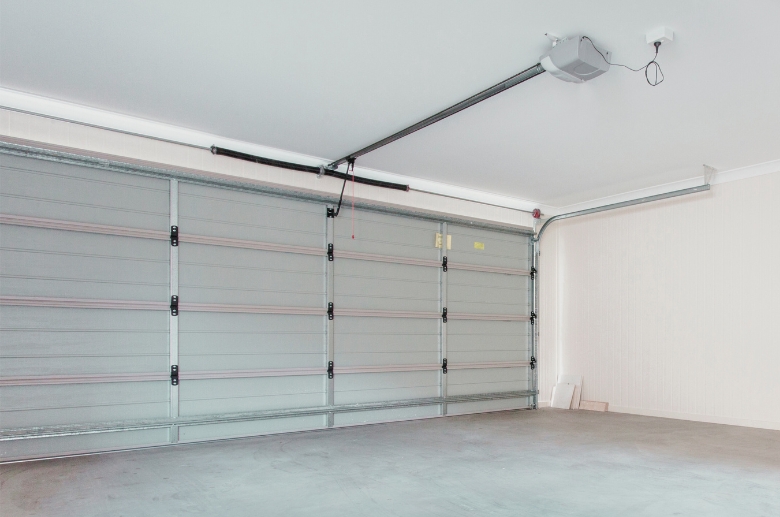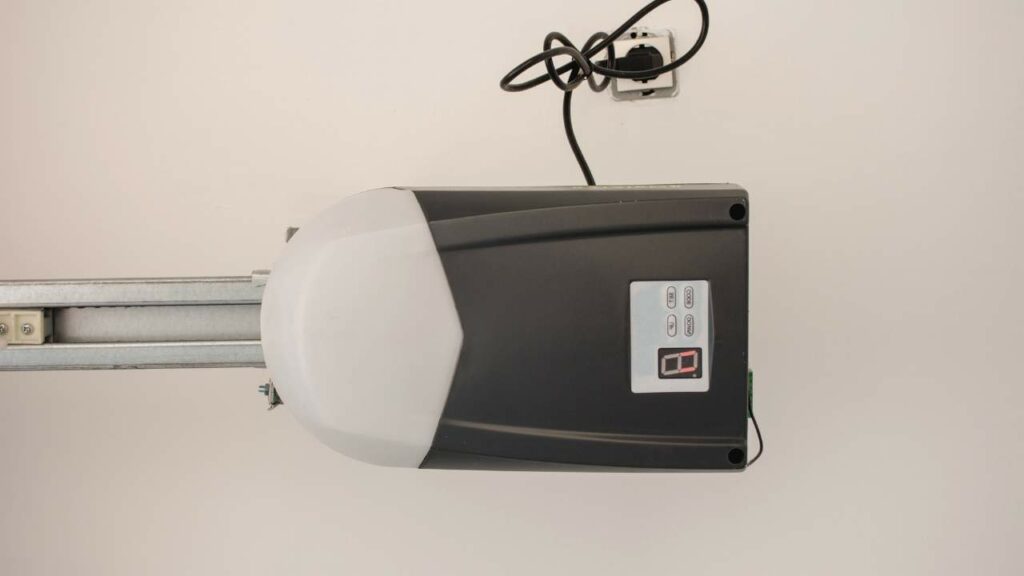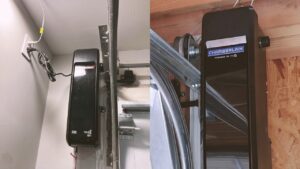Connect With A Garage Expert
Connect with local experts, Compare quotes, Get the best price.
Homeowners often wonder, “What size garage door opener do I need?” But unhelpful online sources and misguiding salesmen often confuse them further.

Selecting the right-sized garage door opener ensures seamless garage door operation and the longevity of both the door and the opener. However, a wrong-size garage door opener can lead to operational inefficiencies and excessive wear and tear, leading to inconvenience and unnecessary expenses.
In this article, we will clearly explain the process of choosing the perfect garage door opener by shedding light on the intricate relationship between the size and power of the opener.
Factors to Consider When Choosing an Opener
When selecting the right opener for your garage door, several key components come into play. Let’s discuss each, one by one, to make an informed decision.
Size and Weight of Your Garage Door

Choosing an opener with the appropriate horsepower ensures longevity, efficient performance, and reduced wear and tear on the motor and other components. The size and weight of your garage door directly influence the type of garage door opener you will need.
For standard “single-car” garages, a basic opener with a ½ HP motor is enough because of their smaller size and lighter weight. The ½ HP motor is powerful enough to handle the standard garage door without breaking a sweat.
However, insulated double garages will often demand an opener with higher horsepower, such as ¾ HP or even 1 HP, to efficiently accommodate the added weight and width.
Garage Door Material

Heavy materials, like steel or wood, demand openers with higher horsepower to manage the weight, ensuring smooth operation and preventing undue stress on the motor. This is where understanding how garage door openers work becomes crucial. Knowing the different power levels available and how they match with various door materials can save you time and expenses in the long run.
A steel door, being durable and heavy, might necessitate a ¾ HP or 1 HP opener, whereas a lighter fiberglass or aluminum door of the same size could operate efficiently with a ½ HP motor.
Besides weight, the material’s maintenance requirements and insulation capabilities can influence your choice. For instance, choosing a steel door for its insulating properties might be an energy-efficient move. Still, it’s essential to pair it with a powerful opener to handle the weight.
On the other hand, a wooden door offers aesthetic appeal but requires more maintenance. It might involve periodic checks on the opener’s functionality due to the door’s weight changes over time.
Thus, the door material determines the opener’s horsepower and indirectly affects maintenance frequency and energy efficiency considerations.
Desired Performance and Features
The performance and features of your garage door also play an influential role in dictating the ideal garage door opener’s specifications.
Which Garage Door Opener Chain Drives Are Better?
When considering the drive type, for instance, chain drives are economical, but their noise levels might not be suitable for heavier doors, demanding frequent operations and leading to amplified noise disruptions.
Similarly, belt drives, being quieter, are often favored for homes that prioritize noise reduction, especially if the garage door is larger and used frequently.
Moreover, noise can often be exacerbated by the repeated opening and closing of oversized doors. A belt-operated mechanism, being inherently quieter, is thus a favored choice for more oversized garages.
Which Garage Door Opener Motors to Use?
For those leaning towards tech integration and smart features, understanding the nuances of garage door opener motors is essential. In DC motors, there’s a relation between horsepower (HP) and Newton (N) measurements.
Specifically, 1 HP is roughly equivalent to 746 watts, while 1 N equates to the force required to accelerate one kilogram of mass at the rate of one meter per second squared. When referring to garage door openers, a motor rated at ½ HP might roughly correspond to a force of 500 N, while a ¾ HP could be close to 700 N.
This compatibility between HP and N in DC motors helps in determining the efficiency and power needed, especially when considering the door’s size and weight. Larger doors, due to their weight, may benefit more from the smoother operations of a DC motor.
Moreover, DC motors generally offer better compatibility with modern tech features. Safety elements like auto-reverse and sensors become increasingly important with larger doors due to the greater potential risk they pose.
The door’s size and weight also play a pivotal role in deciding between AC or DC motors. Since DC motors provide a more gradual start and stop, they reduce the wear and tear on heavier doors and increase the garage door’s lifespan.
Maintenance and Durability
Maintenance and durability are primary considerations when selecting a suitable garage door opener, especially with the door’s size and weight. The longevity of an opener is intertwined with how well it can accommodate the demands of the door it’s tasked to operate.
For instance, while belt drives are renowned for their smoother operation, they inherently present fewer wear-and-tear issues, especially when operating heavier doors. This means your garage door won’t need frequent maintenance and will remain operational for much longer.
Conversely, more budget-friendly chain drives may face accelerated wear when used with heftier doors. This might lead to more frequent maintenance checks, replacements, or repairs over the opener’s life.
Every opener type has its own maintenance rituals; some might need regular lubrication, others periodic adjustments. So, you must recognize these distinctions in order to make an informed decision.
Moreover, regular inspections play a pivotal role in ensuring the opener remains in optimal condition, and any worn-out components are swiftly identified and replaced. This proactive approach bolsters safety and extends the opener’s life.
/
Popular Garage Door Opener Brands
Chamberlain and Genie Garage lead the pack with their diverse offerings in size and power.

Genie Garage brings forth garage door opener models known for their advanced features and reliable performance, suitable for diverse garage dimensions. Their offerings integrate Wi-Fi and smartphone capabilities, allowing remote control and monitoring for maximum convenience.
A standout feature is the battery backup, ensuring uninterrupted operation even during power outages. Enhanced safety is assured with integrated LED lighting for better visibility and an auto-reverse safety system that detects obstacles.
Chamberlain shines with its innovative solutions, offering varied power options tailored for different door sizes and weights. They have motors with specific horsepower (HP) ratings suitable for both lightweight single-car garage doors and heavier, larger doors.
Their range ensures every door operates smoothly and efficiently, matching the right power to the door’s needs, promoting safety and durability.
Connect With A Garage Expert
Connect with local experts, Compare quotes, Get the best price.
What Size Garage Door Opener Do I Need?
To answer the question, “What Size Garage Door Opener Do I Need?” consider the material and the size of your garage door.
A ½ hp opener is suitable for standard single doors, which are lighter. For larger double doors, especially those made of heavier materials, a ¾ hp opener or more is often needed to ensure optimal performance and durability, allowing homeowners a hassle-free experience.
Keep in mind that choosing the correct opener size is crucial for efficiency and functionality. Here’s a table to help you understand what size garage door opener suits best for different garage door size chart:
| Garage Door Size | Recommended Motor Power | Additional Notes |
| 10×8 feet (Single car) | ½ HP (AC motor) or 500 N (DC motor) | Suitable for typical weight and design of single-car garage doors. |
| 16×7 feet (Two-car) | ¾ HP (AC motor) or 700 N (DC motor) | Ideal for increased width and potential weight, especially with solid wood or additional insulation layers. |
| 10×10 feet | ½ HP (AC motor) | Good for the typical weight of doors this size. |
| 9×7 feet (Standard) | ½ HP (AC motor) or 500 N (DC motor) | Adequate for most materials, from steel to lighter wood. |
| 12×12 feet | ¾ HP (AC motor) | Preferred for doors made of heavier materials for seamless operation. |
| 16-foot | ¾ HP (AC motor) or 700 N (DC motor) | Designed to accommodate added width and potential weight, ensuring balanced operation. |
What are the Risks of Using an Incorrect Garage Door Opener Size?
Using an inappropriate opener size can lead to potential damage to the garage door because an opener that is not suited to the door’s weight and size might strain the door’s mechanisms. It can also lead to unsafe operation because safety mechanisms in garage door openers are designed for specific door weights.
If an opener is mismatched to a door, these safety features might not work as intended. Moreover, it can also lead to premature failure because an opener that constantly strains to lift a door heavier than its design specifications, experiences undue wear and tear.
The continual stress can cause the opener’s motor to burn out quickly, which also results in poor overall performance. Thus compromising both the longevity of your garage door system and your safety.
Being mindful of the correct motor size can help in mitigating these risks, maintaining the integrity of the garage door and ensuring optimal functionality.
Final Thoughts
Selecting the right garage door opener size is critical for the optimal performance and longevity of your garage door. The right size ensures safe operation, prevents premature failure, and maintains the integrity of your garage door.
You should make informed decisions, considering the size and material of their garage doors, and select an opener that best fits your needs and preferences.
Remember, an informed choice today can save a lot of hassle tomorrow. So, review your options carefully and select the best garage door opener that suits your needs, ensuring peace of mind and security.
But if you’re not sure, feel free to consult a garage door professional.




